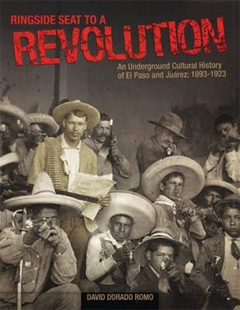
|  |  |  Editorials | Opinions | September 2009 Editorials | Opinions | September 2009  
Guns Don't Belong at Town Hall Meetings
 Jose de la Isla - Hispanic Link Jose de la Isla - Hispanic Link
go to original
September 03, 2009


| Ringside Seat to a Revolution: An Underground Cultural History of El Paso and Juarez, 1893-1923
by David Dorado Romo

Check it out on Amazon.com |  |
The armed men injecting themselves into the town hall meetings on universal health care remind me why it is important to tell the thugs to go home the way Carmelita did.

There's a reason to truncate that kind of serial intimidation, whether by a government or by unregulated militias. In his book "Ringside Seat to a Revolution," David Dorado Romo brings this to light.

His great-aunt Adela told him that back in 1917, she and other working-class Mexicans who crossed the border daily from Ciudad Juarez to El Paso, were ordered off the trolley and forced by U.S. authorities to take a bath and then be sprayed with pesticides at the Santa Fe Bridge. Rumors circulated (later verified) that naked Mexican women were secretly photographed as they bathed.

Customs officers put the women's clothing in a large dryer. Adela added the detail that one of those times the dryer melted her shoes.

To Romo, all this seemed like a family yarn until, while researching his book at Washington's National Archives, he ran across a photo of the steam dryer and the story about the "bath riots."

Its protagonist was a 17-year-old maid, Carmilita Torres. The newspapers described her as "an auburn-haired Amazon." Crossing the bridge one morning, Carmelita defied the U.S. officers and convinced 30 other women to get off with her and protest the humiliating practice.

The year before, 27 men were burned alive in jail after an explosion and fire following a similar "public health" measure that had them soak their clothes in gasoline, creosote and formaldehyde and then wash their bodies in a brew of gasoline, coal oil and vinegar.

As Carmelita and the other women marched on the disinfection camp, 200 more women joined them. By noon, according to press accounts, they numbered "several thousand."

They blocked traffic going into El Paso. The customs inspectors who tried to disperse them were pelted with bottles, rocks and insults. The army commander at Fort Bliss ordered soldiers to the scene, where the street battle continued and a sergeant was hit in the face by one of the "Amazons."

The "Amazons" wrenched the controls from the trolley motormen and held one of them hostage. A Mexican death squad commander (these were revolutionary times), Gen. Francisco Murguia, ordered his cavalrymen to point sabers at the crowd, inciting the women to jeer, hoot and attack the soldiers. An onlooker who hollered out "Viva Villa!" was reported executed by Murguia's men.

So what's the connection between 1917 and 2009?

Historical records show that customs officials began using Zyklon B in the disinfectant building, which they called "the gas chamber." An article in a 1938 German publication specifically praised the use of Zyklon B to fumigate immigrants. The Nazis adopted it as the chemical agent used at German border crossings and concentration camps. For the Final Solution, they used Zyklon B pellets in the gas chambers to exterminate millions.

The Bath Riots of 1917 were the first skirmish in the resistance to the slaughters that became the shame of the 20th century. It all started over issues concerning public health.

You and I can feel the vehemence of the authoritarian personalities pressing to control the health discussion outside and inside the town-hall meetings. The psychodramas in those ruffians' heads turn things upside down. They make it seem like they are the ones in danger and need to preserve their way of life that is in danger. That's why -they want us to believe - they brandish guns, talk tough, and loud.

These are dangerous times when AK-47s and other guns, the symbols of death, are brandished during talk about health care, a life-affirming expression.

And then there is the memory of what Carmelita and the Amazons did. With their feminine voices, about to be doused in the cleansing fluids, they stood up against bad policy and men with guns. |

 |
|  |



